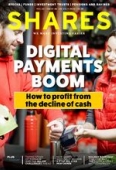Archived article
Please note that tax, investment, pension and ISA rules can change and the information and any views contained in this article may now be inaccurate.
Why do companies join the stock market and which ones can I invest in?

In the previous part of this series we defined what a share was, how you can generate a return by investing in them and how this return can be made up both of dividends and capital gains.
In this article we turn to the menu from which you can pick shares. After all, shares come in different sizes, shapes and flavours just like the dishes you choose in a restaurant or from a takeaway menu.
Before we stretch the analogy too far it is worth clarifying that we are talking about the wider stock market and the different exchanges, sectors and stocks it encompasses. It is this market of buyers and sellers which enables you to buy and sell shares. In the UK nearly all shares are traded on the London Stock Exchange.
WHY DO BUSINESSES JOIN THE STOCK MARKET?
There are a variety of reasons why a company joins the stock market. These include raising the profile of the business, increasing its credibility with customers and prospective lenders, and potentially to use shares for acquisition purposes.
A key motivation is to gain access to investors’ capital and as a way for the founders of a business or staff to profit from a successful venture by selling some of their interest to new shareholders.
Firms typically raise money when they first join the stock market and may well follow up with further issues of shares when they need more cash to finance their growth ambitions.
Typically, but not always, a business will wait until it has reached a certain level of maturity before joining the stock market, perhaps already generating a profit.
After all, this is not a cost-free equation, there are significant fees and responsibilities associated with being a public company. Engaging with the market will take up a significant chunk of management’s time.
Not all companies have a stock market listing. Confectionery giant Mars and toy maker Lego are just two examples of high-profile brands which have no stock market presence as they are privately owned.
THE LIST OF COMPANIES ON THE STOCK MARKET
You can download a full list of all the companies on the stock market from the London Stock Exchange website.
According to the World Federation of Exchanges, as of May 2020 there were 2,359 companies listed on the London Stock Exchange with a total market value of $3.16 trillion.
Shares are divided into different sectors based on the industry in which they operate. There are different layers of sector – the Industry Classification Benchmark is a global standard which has four tiers with 11 different industries, 20 supersectors, 45 sectors and 173 subsectors.
As a snapshot of how this works, the accompanying table shows the consumer staples industry classification and the supersectors, sectors and subsectors within it.
This separation into different sectors makes it easier for an investor to identify potential investment opportunities.
SHARE PRICE INFORMATION
The UK stock market is open from 8am until 4.30pm. During this time share prices will probably move up and down depending on demand from people wanting to buy and sell. Share prices will be heavily influenced by news either specific to a company or to sectors or even broader factors such as central bank interest rates, economic activity and political events.
You can find the latest share prices on a variety of websites, ranging from Shares’ own website and that of your ISA or SIPP (self-invested personal pension) provider to those run by the London Stock Exchange and more specialist finance data sites such as Morningstar.
FOCUSING ON WHAT YOU UNDERSTAND
If you are new to investing it might make sense to concentrate on companies whose products and services you recognise, understand and can easily research. This might include a supermarket like Tesco (TSCO) or a property website such as Rightmove (RMV).
You might, for example, see your local streets busy with Tesco delivery vehicles and make the educated guess that this local phenomenon was being replicated across the country.
That doesn’t mean Tesco shares are automatically worth buying; you would need to do further research into areas like valuation (is the stock cheap or expensive?) which we will cover in future parts of this series, but it does illustrate how you can apply what you see with your own eyes to your investing.
Alternatively, if you work in a specific industry you might feel qualified to invest in other participants in the same industry because you are familiar with how it works.
Redrow's stock market experience
Registered by a 21-year-old Steve Morgan in the 1970s after taking over a failing civil engineering business with the help of a £5,000 loan from his dad, Redrow (RDW) got into housebuilding in 1982.
Having navigated some ups and downs in the housing market, it joined the London Stock Exchange in 1994 raising around £60 million to invest for future growth.
Having sold much of his stake and stepped away Morgan subsequently returned to lead the business in the wake of the financial crisis when the group also raised £150 million from shareholders to shore up its balance sheet. Morgan abandoned an attempt to take the group private in 2013 and eventually retired in 2018. As of June 2020, Redrow was worth £1.7 billion.
THE DIFFERENT INDICES
As well as sitting in different sectors, stocks also trade on a variety of exchanges and belong to various indices, the latter being specific baskets of shares relating to characteristics such as the size of a company.
The London Stock Exchange encompasses the Main Market and AIM, the latter principally aimed at smaller growth-focused businesses and has looser regulation than the Main Market. There is also a rival market called NEX Exchange which is aimed at junior companies.
The flagship index for the UK is the FTSE 100 which is made up of the largest firms listed on the London Stock Exchange. There is also the FTSE 250 which is the venue for medium-sized firms and the FTSE All-Share which includes pretty much everything on the Main Market.
Many FTSE 100 businesses have international horizons, but some areas like technology are under-represented on the UK stock market and this is one of the potential motivations for more experienced investors to broaden their search to other stock markets around the world and look at indices such as the S&P 500 or Nasdaq in the US.
Important information:
These articles are provided by Shares magazine which is published by AJ Bell Media, a part of AJ Bell. Shares is not written by AJ Bell.
Shares is provided for your general information and use and is not a personal recommendation to invest. It is not intended to be relied upon by you in making or not making any investment decisions. The investments referred to in these articles will not be suitable for all investors. If in doubt please seek appropriate independent financial advice.
Investors acting on the information in these articles do so at their own risk and AJ Bell Media and its staff do not accept liability for losses suffered by investors as a result of their investment decisions.

 magazine
magazine












